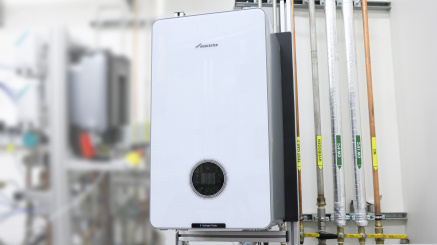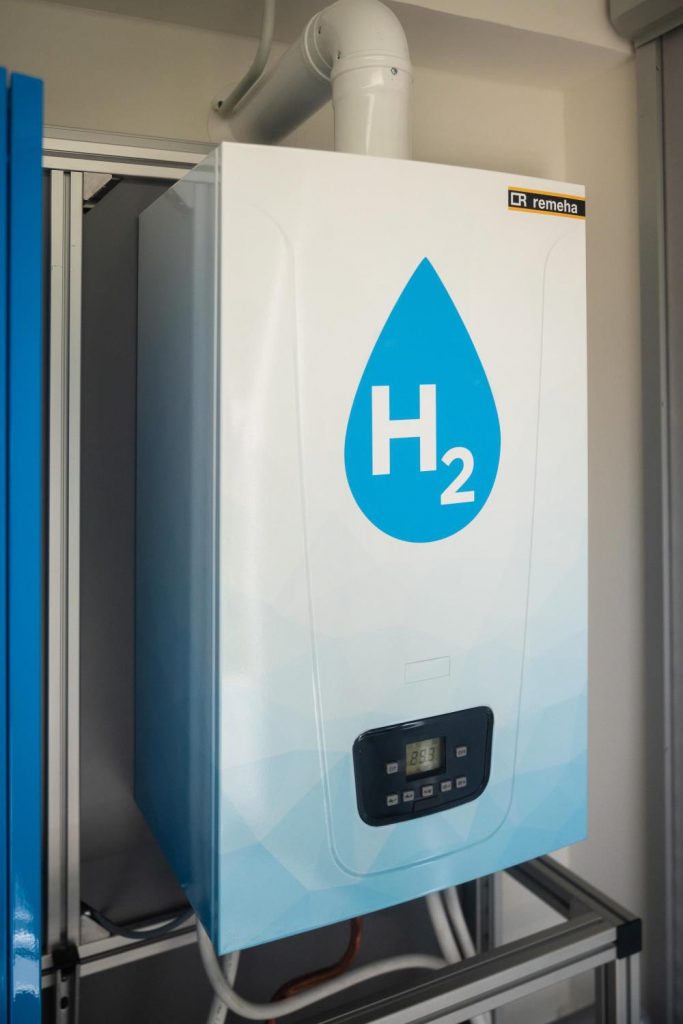Recent talk of a net zero target for UK carbon emissions by 2050 has put domestic space and water heating back in the spotlight. Gas boilers are likely to be banned in new homes built after 2025, with a combination of heat pumps, better insulation and ventilation reducing the demand for heating energy.
However, the gas industry is now responding to the threat to their business with innovative technology and proposals to use 100% hydrogen gas boilers. This provides an alternative zero carbon solution for both new homes and the millions of existing homes that currently use a gas boiler for heating (85% of UK households). Older homes are a challenge to decarbonise as many are not suitable for heat pump technology without significant spend, of the order of £20,000 – £30,000 per home.

Image courtesy of Worcester Bosch
As a result of manufacturers efforts, a new generation of gas boilers could soon be with us that can be used both with 100% hydrogen and natural gas (which is primarily methane, CH4). Assuming the natural gas network switches over to pure hydrogen in the 2030s and 2040s then potentially most gas boilers could be switched to using the new fuel with a simple adjustment to reconfigure it (maybe even automatically in some cases).
One of the UK’s leading boiler manufacturers. Worcester Bosch, has recently presented a prototype hydrogen boiler which could be used with existing central heating systems to heat homes whenever the switch to hydrogen occurs (See press release 14 Jan 2020: https://www.worcester-bosch.co.uk/about/news/making-essential-steps-towards-a-hydrogen-fuelled-future).

Image courtesy of BDR Thermea
BDR Thermea, owners of Baxi boilers have also been active in developing a hydrogen boiler solution (See press release 25 June 2019: https://www.bdrthermeagroup.com/en/news/hydrogen). They also mention one of the other attractions of converting the gas network to hydrogen: the ability to operate small scale hydrogen fuel cells to generate electricity for use in the home. With access to a hydrogen supply there is potentially no need to have an electricity grid connection. One to watch in coming decades.
There are several technical challenges that manufacturers will need to overcome over the next few years. These include:
- Gas tightness: Hydrogen is a smaller molecule than natural gas (methane) so small changes to the way pipes are manufactured and sealed may be needed to maintain current gas leakage rates.
- Flame detection: Hydrogen burns with a near invisible flame so boilers designs will need other ways of detecting that the flame is actually burning. That could be by detecting its ultra-violet (UV) emissions.
- Condensate: Modern condensing boilers already produce condensate (water) but hydrogen boilers produce a greater volume, and this will need to be allowed for within new designs.
There will no doubt be other minor design tweaks to allow effective and efficient use of both natural gas and hydrogen, but boiler manufacturers sound increasingly confident that they can deliver the required products. In the meantime, work is going on within the gas grid to replace old cast iron gas mains with polythene pipe. This would allow every single one of the country’s gas pipes to carry hydrogen rather than natural gas.
The jury is still out on the best solution for net zero carbon emissions from homes and it will be fascinating to watch the gas boiler industry battle it out with heat pump manufacturers as both look to seize the opportunity.
I’m currently using bottled LPG in a towngas converted boiler, I’d like to burn Hydrogen in the same unit… Can I ?
It all sounds a bit Pie in the Sky to me. My wife is much younger than I and I would like to leave her with a good cost effective solution before I depart. I currently have a 30 year old gas boiler with enough spares to keep it going for a least another 15 years. I have a separate wood burner and a fireplace with a super flue back boiler which will heat the water. In addition I have an emersion heater in my water tank. The is no roof space for solar panels of any sort and no ground or outer wall space for heat pumps. What would you advise going forward?
Regards
David Bland
Hi David,
It’s hard to make any specific comments without knowing far more about the energy performance of your home but the most cost effective solution long term is often not to need space heating at all (hard to avoid water heating but it’s usually a small element of the cost). So looking at the whole house and working out how to get the best insulation, air tightness and ventilation is a good start. It does depend on the age of the house and is better done with a major refurbishment which is very disruptive. However it then means you don’t have to worry about boiler replacement and are not so dependent on gas prices long term.
Hope this helps.
unless we produce enough GREEN hydrogen there will be no benefit wanted a massive push to produce hydrogen from wind and solar
If gas boiler manufacturers can produce boilers that run on 100% hydrogen, then surely they can come up with a conversion package that will allow existing boilers to run on 100% hydrogen.
Hi David,
The characteristics of hydrogen mean that existing domestic natural gas boilers are unable to be converted to 100% hydrogen although they could in most cases cope with upto 20% hydrogen in the existing gas grid.
Some of the technical challenges are highlighted in the article. A simple one would be condensate. Burning hydrogen produces only water, whilst burning natural gas produces a combination of water and carbon dioxide. So 100% hydrogen produces more condensate and this needs to be allowed for within any design. It’s an easy one to adjust for at design stage but hard to retrofit. Hydrogen also has a higher flame speed, meaning the flame spreads quicker and this needs to be allowed for within the design. Hydrogen burns with a close to invisible flame, meaning existing boiler sensors are not suitable. These reasons and a few others means retrofit is close to impossible. However manufacturers have already designed hydrogen ready boilers which could be installed prior to any changes to the gas grid and then just switched over by the installer at the right time.
1) Has anyone calculated how much CO2 would be produced from manufacturing and installing 20 million boilers and 2) how long would it take for the energy savings of burning hydrogen to offset that? (Assuming there are savings from using green hydrogen and not blue!).
Hi Oliver,
It is not something I have done as there are so many factors to take into account depending on the approach to replacement and what is being replaced and when. The future carbon intensity of energy used in manufacturing materials and components is also likely to be lower than today. The carbon impact of alternative approaches (such as better insulated homes and heat pumps) would be more attractive in some circumstances.
If a hydrogen ready boiler were used when replacing a worn out natural gas boiler (as an alternative to another gas boiler) then there would be little additional difference in manufacturing emissions and an immediate carbon reduction benefit in operations. If the gas boiler was replaced before its full life, then the materials (steel etc) would ideally be re-used or recycled to reduce any impact. The biggest carbon impact would be in upgrading the gas supply network infrastructure to convert it to hydrogen although the impact of this would be assessed over decades rather than months or years.
Heat pump example
The nearest example of embodied carbon emissions is work done for a typical air source heat pump if installed in a UK home as a replacement for a gas boiler. The embodied carbon in the heat pump is around 1,500 kg of CO2. Assuming burning natural gas generates 0.185 kg of CO2 / kWh then installing the heat pump is equivalent to burning 8,100 kWh of natural gas. The annual gas usage of the average UK home is around 13,000 kWh. Installing an air source heat pump would reduce energy demand for heating to around 4,500 kWh per year, a saving of 8,500 kWh. Assuming a similar carbon emissions rate for gas and electricity then it would take less than 12 months for the heat pump to deliver a net benefit in terms of carbon emissions. Read more at: Why I replaced my new gas boiler with a heat pump (external link).
No doubt the hydrogen boiler impact will receive more detailed attention if it becomes a mainstream possibility. Based on the heat pump example, the embodied carbon of the system is not one of the key considerations.
Kind regards
Jon